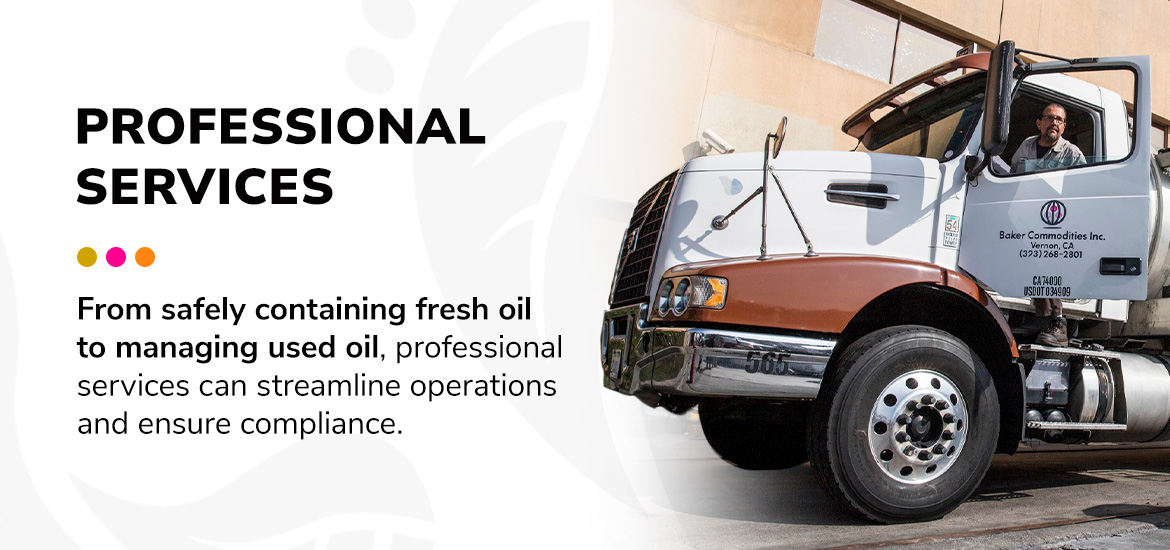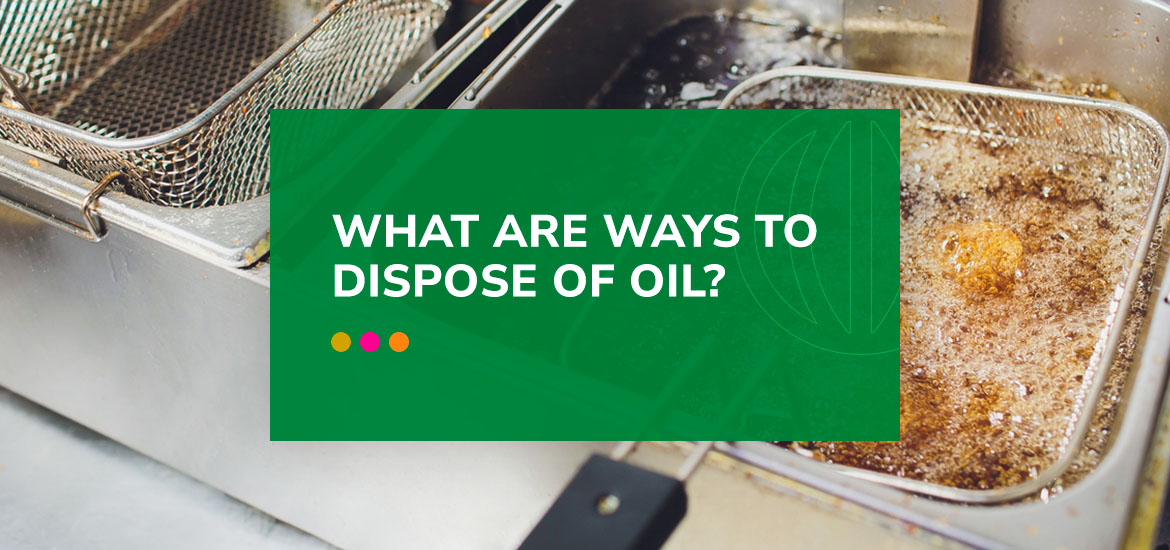What Are Ways to Dispose of Oil?
Many facilities use multi-gallon containers of cooking oil on a regular basis. As you can imagine, following proper guidelines is vital in these settings. There are several safe ways of disposing of oil. If you work with significant volumes of oil on a daily basis, discover how you can protect the environment and enhance operational efficiency.
- Why Does Oil Recycling Matter?
- Consequences of Improper Oil Disposal
- How Baker Commodities Collects and Reuses Cooking Oil
- Innovative Uses for Recycled Cooking Oil
Why Does Oil Recycling Matter?
Recycling oil can have a host of benefits, the most important being reducing your operation’s negative effects on the environment. You’ll do your part in adopting more sustainable practices for a greener world.
Properly disposing of cooking oil also creates a safer, healthier working space. With proper handling and recycling, working areas can remain eco-friendly and more hygienic.
What are the Consequences of Improper Oil Disposal?
Whether throwing cooking oil down the drain, toilet or in the trash, improperly getting rid of cooking oil can have multiple repercussions. These repercussions aren’t only inconvenient but can take up your time and can often be expensive.
Explore some of the most common problems caused by improper oil disposal below:
- Clogged drains: Throwing cooking oil down the drain can cause clogs. When oil is warm, it’s in liquid form, making it seem safe to throw in the drain. However, once it hardens, it causes blockages that need professional plumbing assistance, causing operational delays and extra costs.
- Environmental harm: When cooking oil is thrown away improperly, it can pollute the environment and wind up in landfills. It burdens efforts to create a safer environment for our water systems, animals and plants.
- Legal penalties: Most regions have their own codes for disposing of large amounts of oil, and doing so improperly could result in expensive fines.
3 Steps for Proper Oil Collection
When getting rid of used cooking oil (UCO), you can take steps to protect the environment and your drainage system.
Step 1. Safely Contain the Oil
Never throw cooking oil in the trash. Once you’ve finished using the oil, let it cool down and carefully pour it into containers. These containers should have a tight lid and be able to handle the amount of oil being poured into them. Once secured, the oil is ready for professional collection.
Step 2. Recycle Responsibly
Recycling is one of the best ways to dispose of UCO. By using a rendering company like Baker Commodities, you ensure the oil is safely collected and used for other commercial products like renewable biofuel, food-safe lubricants and animal feed. We’re a carbon-negative company, reducing emissions through effective grease collection and processes.
Step 3. Use Professional Services

If you regularly work with a large amount of oil, it may be best to use the services of a professional company. From safely containing fresh oil to managing used oil, professional services can streamline operations and ensure compliance.
How Baker Commodities Collects and Reuses Cooking Oil
At Baker Commodities, we collect and reuse UCO from our various industry partners. We provide Total Grease Management® solutions for a wide range of industries, including:
We’ll customize the right program for your oil disposal needs. Our services include grease collection, grease trap pumping, drain cleaning, pressure washing and preventive maintenance. Here is a step-by-step outline of our process:
Our Oil Disposal Process at Baker Commodities
We work with a proven process to efficiently get rid of cooking oil for sustainable reuse.
Step 1: Grease Collection
First, we collect the used grease from your facility. You can choose your preferred method of grease removal. You might opt for either a traditional barrel and drum service or an automatic pumping system within storage tanks. We use the highest-quality grease collection equipment, including industrial-grade indoor container tanks, as well as outdoor solutions and systems. We can handle any grease volume, no matter how big or small.
Step 2: Grease Processing
Once we’ve collected your used grease, we’ll process it for repurposing. This may involve refining, heating, filtering, centrifuging or other treatments depending on the chosen secondary use, which will turn it into useful yellow grease. After the oil has undergone appropriate treatments, it becomes a valuable resource for many different industries.
Step 3: Grease Recycling
There are many uses for used cooking oil. We’ll recycle your UCO, making it usable again rather than allowing it to sit in a landfill or pollute the environment. Read on to learn how used cooking oil can take on new life through recycling.
Innovative Uses for Recycled Cooking Oil
Processed used cooking oil, also known as yellow grease, is one of the most versatile recyclable substances. When you opt for our recycling service, you can have a major positive impact on the environment, contributing to the sustainable production of numerous goods. Used cooking oil has many potential uses for various industries, including each of the following:
1. Animal Feed
Yellow grease offers nutritional benefits for animal feed. It’s a high-calorie, high-energy additive, which allows for rapid yet natural and healthy animal growth. Farmers often opt for feeds with concentrated yellow grease additives, as it increases their livestock profitability. It’s included in feed meals for poultry, swine and other common farm animals. You may also find it in certain pet foods.
2. Renewable Biofuel
You can also use yellow grease to create a renewable biofuel, offering an environmentally friendly alternative to traditional fossil fuels. Because it’s made from recycled material, its production involves fewer carbon emissions. Recycled UCO is one of the most versatile vehicle-powering alternatives since it works in any petroleum diesel-burning engine. As it burns, it reduces emissions by 86% compared to traditional petroleum. It also has a longer safe storage life and high-performance capabilities.
3. Oleochemicals
Oleochemicals found in yellow grease are a necessary component for many everyday products, including soap, paint, makeup, detergent and rubber. The most prominent oleochemical-reliant product is soap. Oleochemicals serve vital commercial and household purposes.
4. Food-Safe Lubricant
Yellow grease is also useful as a food-safe lubricant. Large-scale food production facilities use industrial equipment, and this equipment’s lubricant has to be non-toxic to keep food products safe for consumption. Since yellow grease is organic and edible in nature, it makes for an ideal equipment lubricant in these settings.
Partner With Us for Total Grease Management®
When you choose the Total Grease Management® program through Baker Commodities, everyone wins. You’ll preserve your drains and appliances, extending their life spans and saving you on repair costs. You’ll also reduce the health and safety risks associated with improper disposal, keeping your employees, patrons and guests safer. Finally, you’ll improve your company’s environmental impact by contributing to used oil recycling efforts. You’ll have the opportunity to advertise your social conscience, which could lead to increased sales.
At Baker Commodities, we tailor our grease removal and repurposing services to your unique needs. We take care of the entire process for you. We’ll put together an individualized plan after meeting with you and evaluating your facilities. We hold ourselves to high-quality service standards, providing personal support and 24/7 emergency response. If you’re looking for a safe, beneficial and environmentally conscious way to dispose of used cooking oil, contact us today.



